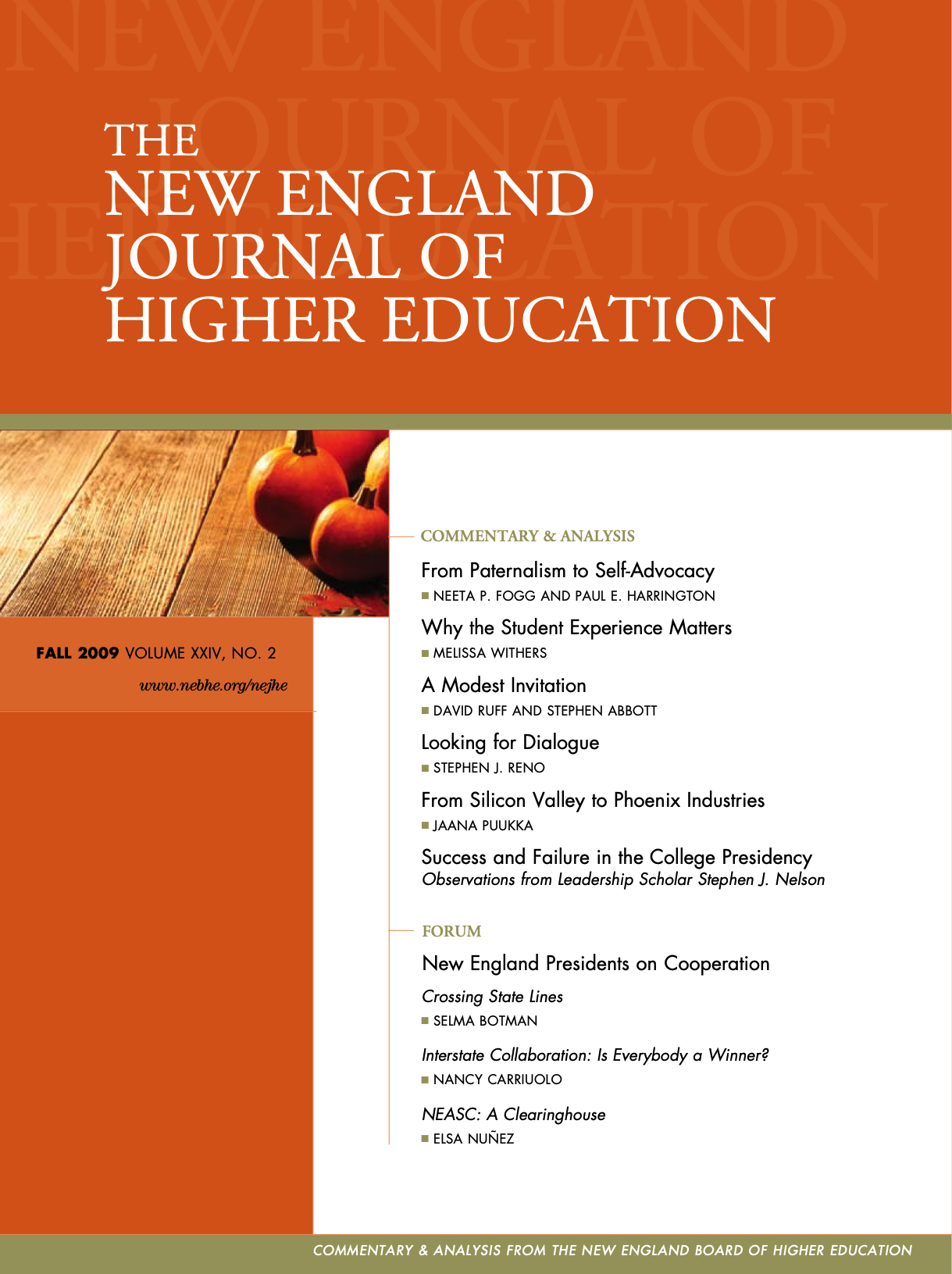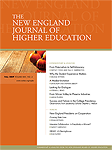
Click the cover image to view and download this issue in PDF format.
Fall 2009 New England Journal of Higher Education Unveils New Findings on Community Colleges and Students with Disabilities
Forum features New England college presidents on higher ed cooperation
Selected articles available to view and download from NEBHE website
Contact:
John O. Harney, Executive Editor,
New England Journal of Higher Education
617-357-9620 ext. 101 or jharney@nebhe.org
Boston, Oct. 9, 2009 – President Obama’s strategy to increase degree attainment will require increased graduation by community college students, many of whom have disabilities, according to a new study by Northeastern University economists Neeta P. Fogg and Paul E. Harrington to be published in the Fall 2009 issue of The New England Journal of Higher Education.
Fogg and Harrington’s article “Paternalism to Self-Advocacy” notes: “In high school, students with disabilities are in a protected environment compliant with IDEA (Individuals with Disabilities Education Act) legislation, where their disabilities are diagnosed, IEPs (Individualized Education Plans) are designed and services specific to their disabilities are provided. In college, the responsibility for disclosing disabilities and seeking services falls squarely on the student.”
“Community colleges are in the business of serving large numbers of students with a variety of disabilities, but their knowledge of these students–who they are or even how many of them are enrolled–is often quite limited,” write the Northeastern economists.
In addition to the article by Fogg and Harrington, the Fall 2009 NEJHE features:
Why the Student Experience Matters
Most conversations about education reform reflect the perspective and agenda of the institutions that provide educational services, rather than the needs of the students they serve. Melissa Withers explains how the Providence-based Business Innovative Factory that she directs plans to use its proven brand of deep research to change that.
A Modest Invitation
How can colleges advance secondary school reform? David Ruff and Stephen Abbott of the Great Maine Schools Partnership explain that the first step forward is to acknowledge that the two systems are deeply and inextricably connected.
Looking for Dialogue
University System of New Hampshire Chancellor-emeritus Stephen J. Reno warns that in order to develop a shared language of expectation with business and professional constituencies, academics need to check their “attitudes” at the door.
From Silicon Valley to Phoenix Industries
Pursuing a regional agenda is a tough challenge for research-intensive universities with their focus on national and international excellence. But Jaana Puuka of the Organisation for Economic Co-operation and Development explains how a thriving regional economy benefits the universities in innumerable ways.
Success and Failure in the College Presidency
Stephen J. Nelson, assistant professor of Educational Leadership at Bridgewater State College and senior scholar, Leadership Alliance at Brown University, shares observations after this third book on college presidents.
Forum: NEJHE asks New England College Presidents to Explore Topics in Collaboration
Crossing State Lines
University of Southern Maine President Selma Botman notes that New England can play a nationally important leadership role by placing the student at the center of higher education’s work, not only within universities or university systems, but across the whole region.
Interstate Collaboration: Is Everybody a Winner?
Rhode Island College President Nancy Carriuolo warns that when considering a long-distance relationship, everyone should first determine the stakeholders and then ask what the benefits are to each.
NEASC: A Clearinghouse
Eastern Connecticut State University President Elsa M. Nuñez says all members of the New England higher education community should consider how we can further leverage local successes on the regional stage.
A Whole New U
NEBHE President and CEO Michael K. Thomas calls for a new attitude among higher education leaders, students and faculty to increase efficiency and productivity.
Waging War on Illiteracies
NEBHE Chair and Massachusetts state Sen. Joan Menard explains how demands for new kinds of literacy have exploded with the increased complexity of tasks.
Campus Visiting
In his quarterly Editor’s Memo, NEJHE executive editor John O. Harney relates some new lessons in college visiting.
For more than 20 years, the New England Board of Higher Education’s journal on higher education and economic issues was known as Connection: The Journal of the New England Board of Higher Education. In 2007, NEBHE “re-branded” the quarterly as The New England Journal of Higher Education or NEJHE.
The New England Board of Higher Education (NEBHE) is a nonprofit, congressionally authorized agency established in 1955. NEBHE’s mission is to provide greater education opportunities and services for New England residents. Its core functions include programs and services focused on cost savings and affordability and college access and success. It also provides policy leadership on key issues related to education and the economy.
[ssba]
